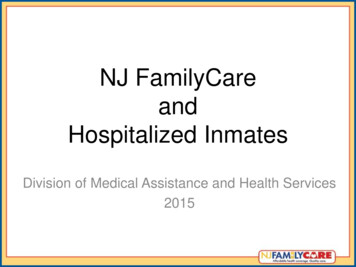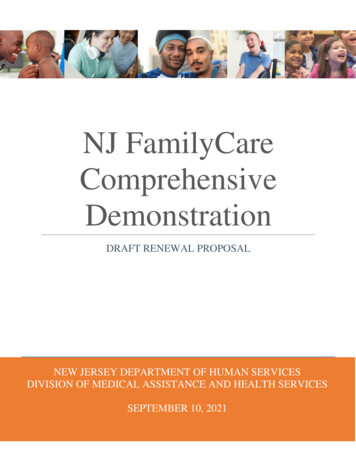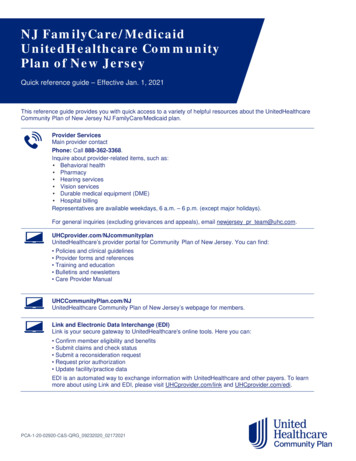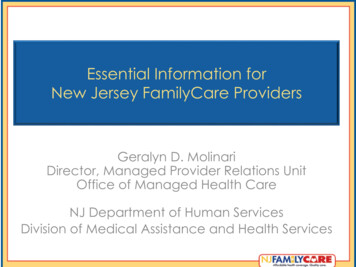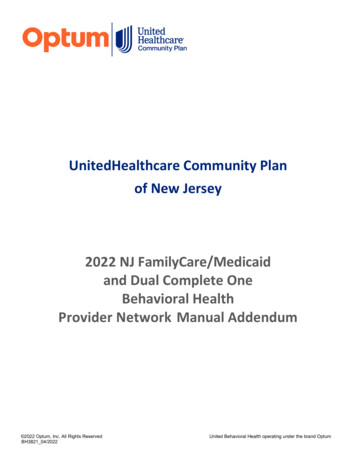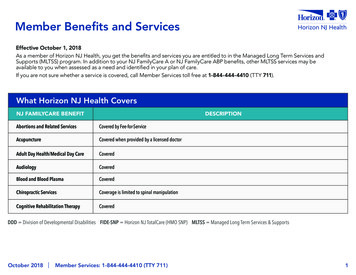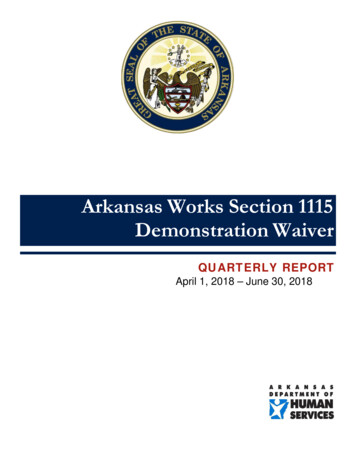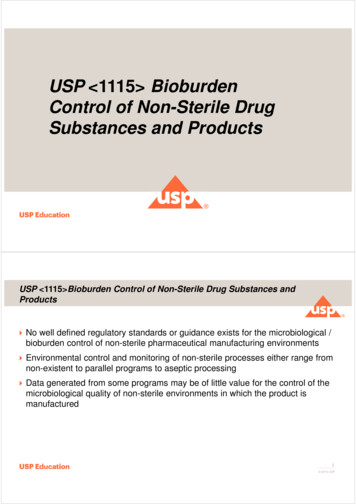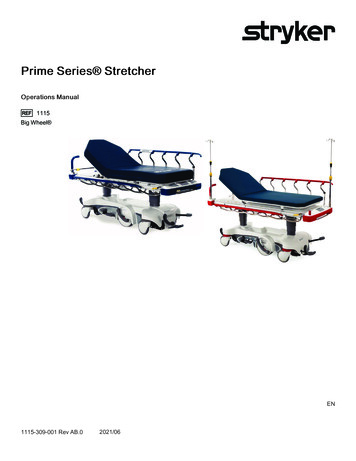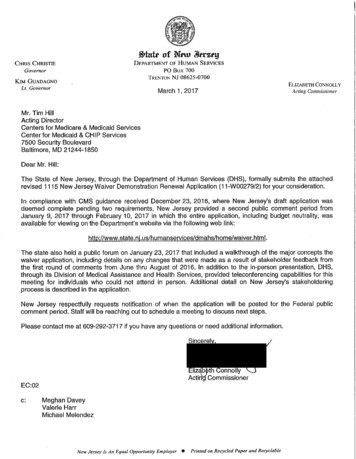
Transcription
NJ FamilyCare 1115 Comprehensive DemonstrationApplication for RenewalStrengthening Medicaid: Alignment & Redesign Through IntegrationNJ Department of Human Services2/24/2017
Table of ContentsExecutive Summary . 2Historical Summary . 3Concepts for Renewal: Looking Ahead to the Next Five Years . 5Description of Waiver and Expenditure Authorities . 27Overview of the Renewal Demonstration Evaluation . 31Program Quality and Monitoring Activities . 38Interim Evaluation . 38Budget Neutrality and Monitoring . 38Public Notice Process . 39STC Compliance . 42Conclusion . 42Enclosures/Attachments . 43NJ FamilyCare 1115 Comprehensive Demonstration Renewal ApplicationPage 1
Executive SummaryThe New Jersey Department of Human Services, Division of Medical Assistance and HealthServices is pleased submit the following 1115 Waiver renewal application for the 1115Comprehensive Waiver. The Comprehensive Waiver was approved in October 2012 for fiveyears with the ultimate goal of changing New Jersey’s health care delivery landscape to ensure amore community and person-centered continuum of care. As described in the historical narrativebelow, and through the interim evaluation report the §1115 waiver not only consolidatedauthority for several existing Medicaid waivers, but initiated a variety of health reforms in NewJersey’s Medicaid program. The key changes authorized by the Waiver are an expansion inmanaged care to Long Term Services and Supports (LTSS) and behavioral health (BH) services,targeted home and community-based services (HCBS) for populations of children and in-homecommunity supports for individuals with intellectual and developmental disabilities,administrative simplifications in the Medicaid eligibility process for low-income applicantsseeking LTSS, and the establishment of a hospital-based Delivery System Reform IncentivePayment (DSRIP) Program.The renewal application builds upon the successes and opportunities of the currentDemonstration through targeted initiatives designed to modernize and align the way New Jersey:provides behavioral health and substance use disorder services; integrates care for incarceratedindividuals; expands the scope and duration of support services for individuals with intellectualand developmental disabilities and creates a supportive housing benefit for homeless andchronically homeless high utilizer beneficiaries. Also included in this renewal is the continuationof DSRIP funding and a new population health initiative.The renewal application is organized into the following sections: A review of the alignment and integration made possible under the current Demonstrationwaiver; A summary of planned initiatives proposed under this renewal application; A description of the requested waiver and expenditure authorities, A summary of demonstration quality activities; Copies of the Interim Evaluation and DSRIP mid-point Evaluation; An overview of the planned budget neutrality methodology and monitoring activities; A summary of DMAHS’s comprehensive public input process; and, A summary of compliance with the Demonstration’s Special Terms and Conditions.NJ FamilyCare 1115 Comprehensive Demonstration Renewal ApplicationPage 2
Historical SummaryIn October 2012, New Jersey’s application for a five-year section 1115(a) Waiver Demonstrationto streamline the administration and operation of its Medicaid and CHIP programs was approvedby the federal Centers for Medicare and Medicaid Services. The Demonstration runs throughJune 30, 2017. The New Jersey 1115 Comprehensive Waiver Demonstration (Demonstration)was initiated to: Integrate primary, acute, behavioral health care, and long term services and supports;Establish a federally funded Supports Program that provides a wide array of services toindividuals with intellectual or developmental disabilities who are living at home withtheir families;Advance Managed Long Term Services and Supports (MLTSS), which increasesutilization of home and community based services for seniors and individuals withdisabilities, instead of nursing facility or other institutional care;Make changes to the hospital delivery system of care by transitioning funding from theHospital Relief Subsidy Fund to an Incentive Payment model;Increase community-based services for children who are dually diagnosed withdevelopmental disabilities and mental illness by providing case management, behavioraland individual supports; and,Expand managed care to individuals in need of long term services and supports; divertmore individuals from institutional placement through increased access to home andcommunity-based services (HCBS), and to promote delivery system reform throughhospital funding incentives under a Delivery System Reform Incentive Payment (DSRIP)Program.Over the five-year approval of the Comprehensive Waiver Demonstration, New Jersey requestedamendments and technical corrections to the original waiver. A summary of these changesinclude: April 18, 2013: Initial technical corrections to the Demonstration were approved byCMS that aligned the Special Terms and Conditions (STCs) with how New Jersey wasoperating the demonstration.August 8, 2013: The Delivery System and Reform Incentive Payment (DSRIP) programwas modified so that the Hospital Relief Subsidy Fund (HRSF) transition payments couldbe extended through December 31, 2013.December 23, 2013: A conforming change was made to align the terms of the GraduateMedical Education program to the Medicaid State Plan. DMAHS also received approvalNJ FamilyCare 1115 Comprehensive Demonstration Renewal ApplicationPage 3
to include the Medicaid Expansion group as part of the Affordable Care Act (ACA)Transition Plan.March 27, 2014: An amendment was approved to revise the state and CMS DSRIPaction deadlines.August 14, 2014: Technical corrections were approved that included adding theQualified Income Trust group, updating Per Member per Month’s (PMPM) based on theGraduate Medical Education (GME) amount, inclusion of the MLTSS ServicesDictionary and benefit updates for Attachment B.February 11, 2016: DMAHS received approval to expand eligibility for the SupportsProgram to include individuals that are in need of services and do not currently qualifyfinancially. Also, the terms were revised to allow individuals who are currently in theSupports Program to access Private Duty Nursing (PDN) services from the ManagedLong Term Services and Supports (MLTSS) program.Since approval of the demonstration, New Jersey has consolidated the delivery of health careoperations and services under several separate state authorities, including the Medicaid StatePlan, existing CHIP State Plan, four previous 1915(c) waiver programs, a 1915(b) waiverprogram and two standalone section 1115 demonstrations.During the last five years, New Jersey has sought to achieve the following objectives: Create “no wrong door” access and less complexity in accessing services for integratedhealth and long-term care (LTC) care services;Provide community supports for LTC and mental health and addiction services;Provide in-home community supports for an expanded population of individuals withintellectual and developmental disabilities;Provide needed services and HCBS supports for an expanded population of youth withsevere emotional disabilities; and,Provide need services and HCBS supports for an expanded population of individuals with cooccurring developmental/mental health disabilities.Encourage structural improvements in the health care delivery system through DSRIPfunding.As part of its effort to realize these objectives since the approval of the Demonstration, the statehas worked to plan and implement a wide range of delivery system reforms including: Implemented a comprehensive integrated community-based MLTSS benefit. Implemented targeted home and community-based programs for beneficiaries with seriousemotional disturbance, autism spectrum disorder; and intellectual and developmentaldisabilities.NJ FamilyCare 1115 Comprehensive Demonstration Renewal ApplicationPage 4
Provided DSRIP funding for hospitals to make significant structural improvements in thehealth care delivery system.Concepts for Renewal: Looking Ahead to the Next FiveYearsIntroductionThe renewal of the Demonstration provides an additional opportunity for New Jersey to continueimproving on the Demonstration delivery system efforts, while continuing to advance itscommitment to transform Medicaid into a value-based, data-driven health care delivery system.The state is requesting a five-year extension of its 1115 Waiver in order to build upon theseaccomplishments and its progress in rebalancing efforts to encourage and promote communitybased, integrated care focused on the whole person. As such, the state is proposing the following:1. Maintain its Managed Long Term Services and Supports (MLTSS) program;2. Move to an integrated, coordinated, and organized behavioral health delivery system, thatincludes a flexible and comprehensive substance use disorder (SUD) benefit;3. Increase access to services and supports for individuals with intellectual and developmentaldisabilities;4. Further streamline NJ FamilyCare eligibility and enrollment;5. Develop an uninterrupted re-entry system for incarcerated individuals;6. Include reinvestment dollars targeting housing support services for individuals who arehomeless or at-risk of being homeless;7. Enhance access to critical providers and underserved areas through alternative providerdevelopment initiatives;8. Continue DSRIP funding to promote and foster health care delivery system innovations; and,9. Expand and enhance population health partnerships with community and faith-basedorganizations, public health organizations, healthcare providers, employers, and otherstakeholders to improve health outcomes for Medicaid-eligible individuals.This application builds upon the successes of the Demonstration through targeted initiativesdesigned to modernize and align the way New Jersey: provides behavioral health and substanceuse disorder services; integrates care for incarcerated individuals; expands the scope and durationof support services for individuals with intellectual and developmental disabilities and creates asupportive housing benefit for homeless and chronically homeless high utilizer beneficiaries.Also included in this renewal is the continuation of DSRIP funding and a new population healthinitiative.NJ FamilyCare 1115 Comprehensive Demonstration Renewal ApplicationPage 5
Below are brief descriptions of each proposal under the renewal. The proposal begins with abrief background on the alignment or integration efforts accomplished to date, and then providesa summary of the requested change under this renewal application.Program Descriptions:Maintaining Managed Long Term Services and SupportsRebalancing service delivery away from institutional care to an integrated, home andcommunity-based setting is a long-standing goal of NJ FamilyCare. The Demonstrationfacilitated streamlining benefits and eligibility for four existing 1915(c) home and communitybased services (HCBS) waivers under one Managed Long Term Services and Supports (MLTSS)Program.Objectives achieved: Create “no wrong door” access and less complexity to integrated care and long termservices and supports (LTSS) Provide Community Supports for LTSS and Mental Health and Addiction ServicesAfter an extensive stakeholder input process, the MLTSS program was implemented on July 1,2014 and represents New Jersey’s successful effort to achieve the objectives of creating “nowrong door” access and rebalance its long term care system to promote HCBS and integrateprimary care, behavioral health and long-term care services and supports into one simplified,comprehensive benefit. Seniors and people with disabilities enrolled in MLTSS have access to abroad array of home and community-based services, such as Private Duty Nursing, HomeDelivered Meals, and Non-Medical Transportation, which support integrated community-basedliving. As part of its efforts, DMAHS and the Division of Aging Services (DoAS) worked withthe County Welfare Agencies (CWAs), Aging and Disability Resource Connections (ADRCs),and Managed Care Organizations (MCOs) to develop a workflow to ensure that no matter whichdoor a person availed themselves to in order to access MLTSS, an individual would be able tomove through the process smoothly and efficiently.A major benefit New Jersey has found under the Demonstration is the ability to allow severaldifferent target groups access to the same benefits. When there were four separate 1915(c)waivers, individuals in one waiver were not allowed to access the benefits in another waiver. Forexample, Private Duty Nursing (PDN) could only be accessed through the CRPD waiver. If theindividual was in the Global Options waiver program, they could not utilize the PDN benefit. Byeliminating these siloes through building one large program, the state has seen a significant shiftNJ FamilyCare 1115 Comprehensive Demonstration Renewal ApplicationPage 6
from institutional to home and community-based care for both the MLTSS and overall long-termcare (LTC) populations.As of June 2016, approximately 28,700 beneficiaries were enrolled in MLTSS. Of theseindividuals, 65% are in home and community-based settings. For the total LTC population,which includes individuals in nursing facilities who did not transition to MLTSS and thoseparticipating in MLTSS, at the start of the MLTSS program, only 28.9% were receiving careoutside of a nursing facility. As of June 2016, that percentage has grown to 40.5%.In January 2015, the MLTSS benefit was carved into New Jersey’s Dual Eligible Special NeedsPlan (DSNP), which serves dual eligible beneficiaries thus integrating the community managedlong-term support and services with both Medicare and Medicaid services and creating a fullyintegrated dual eligible special needs plan (FIDE SNP). New Jersey is one of the few states, ifnot the only state, that require all of its DSNPs to become FIDE SNPs.Today, DMAHS and the Division of Aging Services (DoAS) continues to ensure that consumers,stakeholders, managed care organizations, providers and other community-based organizationsare informed about the program through regular meetings. As part of the Demonstration,quarterly stakeholder meetings are held specific to MLTSS to inform of the progress of theprogram and to solicit public input. The state also has bi-weekly calls with the MCOs in order towork through any issues that have arisen through the implementation and operation of theprogram as well as an internal state operations workgroup that addresses policy issues that are inneed of discussion.Renewal objective: Maintain its Managed Long Term Services and Supports (MLTSS) program.The state is requesting to continue its MLTSS program with revisions to the Special Terms andConditions to reflect the program’s movement from the transition of the 1915(c) waivers into andimplementation of MLTSS to ongoing operation. The state is looking towards focusing onimproving upon the integration of care, the overall quality and health outcomes of its MLTSSpopulation, and continuing to accelerate the rebalancing of the program away from institutionalcare.As part of this effort, New Jersey has been selected to participate in the Medicaid InnovationAccelerator Program (IAP) Incentivizing Quality and Outcomes (IQO) Implementation track ofIAP’s Community Integration-Long-Term Services and Supports program area. New Jersey’sgoals during this opportunity are to transition current performance measures from a focus oncompliance with organizational process to focus on: responsiveness to personal outcomes,NJ FamilyCare 1115 Comprehensive Demonstration Renewal ApplicationPage 7
identifying outcome based measures that best impact our HCBS members’ person-centeredexperience and quality of life; optimizing stakeholder community engagement in thedevelopment of the IQO strategy and policy related changes; obtaining knowledge and toolsthrough our collaboration with NJ’s IQO Implementation Team Coaches and their expertise inLTSS policy, medical economics and research; and MCO Care Management (CM) operations todevelop a successful roadmap for implementation.Strengthening Behavioral Health: Moving to an Integrated and Managed DeliverySystem that Includes a Flexible and Comprehensive Substance Use Disorder (SUD)BenefitFundamental to the vision for the evolution of New Jersey’s Medicaid system is the goal of afully integrated care continuum of acute, primary, long-term, social, and behavioral health. Thesuccessful launch of the MLTSS program provided a strong catalyst to further integration effortsand to increase care coordination around targeted, high-cost populations.Under the current 1115 Demonstration, the state proposed establishing an AdministrativeServices Organization (ASO) and then moving to an at-risk managed care system. In July 2015,the state contracted with a non-risk bearing Interim Managing Entity (IME) to manage a portionof the behavioral health services - both Medicaid and state-only funded services - for SubstanceUse Disorder (SUD) and the mental health Community Support Services (CSS) programs as afirst step in the overall reform of behavioral health services for adults. The IME functions as anASO-like entity in that it manages a 24/7/365 addictions hotline and provides referrals totreatment or other services to callers and their families. The IME received over 62,165 calls fromJuly 2015 through August 2016 and makes referrals to various levels of care for individualsseeking SUD treatment.The state also proposed pursuing the Health Home option available in section 2703 of theAffordable Care Act for individuals with serious mental illness or serious emotional disturbance.To date, CMS has approved State Plan Amendments (SPA) for Behavioral Health Homes (BHH)in five (5) counties for both adults and children. There are approximately 700 adults and 211children served through these Health Homes. Funding was provided in the Fiscal Year 2017 statebudget to expand BHH into six more counties and to serve other populations, includingindividuals with forensic involvement or SUD over the next several years.Under Governor Chris Christie’s leadership, the state made an unprecedented investment of over 120 million to increase Medicaid and state-only funded rates for behavioral health services,which is expected to assist in the recruitment and enhanced training among provider staff. Thefunding also should increase system capacity, providing greater access for individuals seekingtreatment, standardize reimbursement across providers and create greater budgetary flexibilityNJ FamilyCare 1115 Comprehensive Demonstration Renewal ApplicationPage 8
for providers. In addition, the state will expand its Presumptive Eligibility (PE) program to allowbehavioral health providers the ability to complete a PE application for an uninsured individual,which will increase access to care for people most at- risk. Further, the state is seeking CMSapproval to incorporate the SUD benefits that are in the Alternative Benefit Plan to individuals inNJ FamilyCare Plan A, referred to as “true up,” within the SPA authority. The goal of thischange is to maintain parity of benefits available to individuals in each plan and to meet thegrowing need of individuals seeking SUD services within the Medicaid program. The timelinefor these efforts are identified in illustration 1.Illustration 1: Timeline for New Jersey Behavioral Health InitiativesJuly 2016 Medicaid rates for Mental Health (MH) and SUD become effective Medicaid True-Up for SUD becomes effective State rates for SUD become effective SUD state rates become fully fee-for-service (FFS) IME Prior Authorization for SUD State rates for MH become effective State-only MH services move to an optional FFS reimbursement modelJanuary 2017 State-only mental health services become fully FFSJuly 2017 Managing BH servicesNextIn September of 2015, New Jersey was one of eight states awarded a Substance Abuse andMental Health Services Administration(SAMHSA) Planning grant for Certified CommunityBehavioral Health Clinics (CCBHC). CCBHC Planning Grants are the first phase of a twophase process. Phase I provided funds for one year to states to certify community behavioralhealth clinics, establish a Prospective Payment System (PPS) for Medicaid reimbursablebehavioral health services provided by the certified clinics, and prepare an application toparticipate in a two-year demonstration program. NJ has submitted their application for the twoyear demonstration program and the award announcement will be made sometime in December2016.NJ FamilyCare 1115 Comprehensive Demonstration Renewal ApplicationPage 9
Renewal objective: Achieve better care coordination for the promotion of integrated behavioraland physical health to a more patient centered care experience, and to offeraligned financial incentives and value-based payments.Through this renewal, the state is proposing reform strategies for payment and services thatpromote integrated behavioral and physical health care. The rationale of this reform is: toachieve better care coordination and the promotion of integrated behavioral and physical healthfor a more patient-centered care experience and to offer aligned financial incentives and valuebased payments. New Jersey is eager to move forward with the following initiatives: Integrate behavioral and physical health: Under New Jersey’s current structure, physicalhealth services are the responsibility of the managed care organizations (MCOs) and mostbehavioral health services are provided through a FFS system or under a managed, non-riskstructure through the IME. The state is seeking Waiver authority in this renewal to move to amanaged delivery system that integrates physical and behavioral health care. Define performance measures and methodology for distributing earned incentives: In anintegrated system, a set of quality incentive payments would be available for care systemsthat meet state identified performance goals related to quality and outcome measures forintegrated behavioral health care and effective mental health and substance use disordertreatment. The quality incentive payments would be allocated after care organizations havemet the goals.The state is also looking to work with the other provider types, such as Federal Qualified HealthCenters and hospital systems, as a part of the renewal process to determine if there are specificareas where the integration of behavioral and physical health can be improved.Other Behavioral Health Reform Strategies:On July 27, 2015 CMS released a State Medicaid Director (SMD) letter announcing a newopportunity for states to design a service delivery system (SDS) for individuals with SUD undersection 1115 of the Social Security Act (SSA) to ensure a continuum of care is available toservice individuals with SUD. New Jersey seeks waiver authority through this renewal to createan SUD continuum of care that would provide a comprehensive and coordinated SUD benefit toadults and children.The state Medicaid program, DMAHS, met with DMHAS and DCF to discuss the state’s currentMedicaid and state-only funded SUD services. It was determined that there is inconsistency inthe SUD benefit.NJ FamilyCare 1115 Comprehensive Demonstration Renewal ApplicationPage 10
The state proposes to use the nationally recognized American Society of Addiction Medicine(ASAM) criteria for a CONTINUUM of care to direct individuals to the appropriate level ofservice and define the SUD benefit. Levels of care identified in this continuum are:access/screening/referral, ambulatory services, supportive services, residential services, andinpatient services. The state found that there are four main topics that overlapped in all fiveareas of service in the NJ SDS: primary care integration, co-occurring care integration, recoverysupports, and care management (see illustration #2). Other areas identified as key to individuals’recovery: housing supports/recovery housing, crisis intervention, early intervention, and smokingcessation. Based on these findings, the state proposes using Waiver authority to create an SUDcontinuum of care that incorporates both Medicaid and state funds to best meet the needs ofindividuals seeking SUD treatment and support them in obtaining and maintaining recovery. Aspart of this continuum, New Jersey is also requesting authority to claim expenditures for servicesprovided in Institutions for Mental Disease (IMD) for up to thirty days as the current Federalexclusion places severe limitations on Residential Treatment options.Further development of New Jersey’s SUD Service Delivery Continuum will involve a robuststakeholder process and a cross-system workgroup for planning and development of SUDservices. The stakeholder and inter-agency workgroups will have an opportunity to provideinput into the state’s plans. Network adequacy has become an emergent issue for addictiontreatment and Withdrawal Management (detox) in the midst of a statewide and national OpioidCrisis. New Jersey will continue to explore the implementation of new services underAmbulatory Detox in addition to the request related to the IMD exclusion as part of efforts toaddress this.NJ FamilyCare 1115 Comprehensive Demonstration Renewal ApplicationPage 11
New Jersey applied for and was accepted to receive technical assistance through CMS’ MedicaidInnovator Accelerator Program (IAP) Substance Use Disorder (SUD) and Beneficiaries withComplex Needs (BCN) Technical Assistance, which was provided in late 2014 and early 2015.The State applied for these opportunities to inform policy, program and payment reform as itplans the SUD continuum of care in the following areas: identification of a value-basedreimbursement methodology that incentivizes better health outcomes through performancemetrics and, develops methods of enhancing data analytic capabilities in order to effectivelyshare beneficiary information across different state agencies for better care coordination.Enhancing the Targeted Home and Community Based Services (HCBS) ProgramsExpanding Access to Services for AdultsThe Supports Program is administered by the Department’s Division of DevelopmentalDisabilities (DDD) and it provides assistance to NJ FamilyCare adults with intellectual anddevelopmental disabilities so that they may continue to live with their families or in theNJ FamilyCare 1115 Comprehensive Demonstration Renewal ApplicationPage 12
community. Examples of supports include, but are not limited to: assistive technologies,employment and day services, various therapies, home and vehicle modifications, transportation,and training. An initial group of approximately 82 beneficiaries were enrolled in July andAugust of 2015. Approximately 500 individuals currently are enrolled in the Supports Programand a total of 14,000 are expected to be enrolled within the next year.Along with service provision to beneficiaries, a key component of this program is a shift from amultitude of varied provider payment methodologies to a single Medicaid-based fee-for-servicesystem that began in 2015.Objective (in progress): Provide in-home community supports for an expanded population of individualswith intellectual and developmental disabilitiesIn effort to continue to expand access to individuals with intellectual and developmentaldisabilities, the state submitted and was approved for an amendment to expand eligibility for theSupports Program to individuals who meet the functional criteria for the program, and are under300 percent of the Federal Benefit Rate (FBR). Since the amendment’s approval in February2017, the state has worked to operationalize the amendment and currently have 6 individualsenrolled through this eligibility expansion.The second part of the amendment allowed individuals enrolled in the Supports Program to alsoaccess the state’s Private Duty Nursing (PDN) benefit through the Supports Plus PDN programprovided they meet certain clinical criteria. This program helps the state better meet the needs ofindividuals with intellectual and developmental disabilities who are medically fragile.The state is requesting to maintain the Supports Program as-is in order to continue its worktowards full implementation of the program.Along with the Supports Program, DDD also administers the Community Care Waiver (CCW),under 1915(c)
NJ FamilyCare 1115 Comprehensive Demonstration Renewal Application Page 3 Historical Summary In October 2012, New Jersey's application for a five-year section 1115(a) Waiver Demonstration to streamline the administration and operation of its Medicaid and CHIP programs was approved by the federal Centers for Medicare and Medicaid Services.
